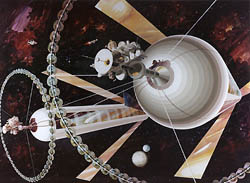Colonies
From Gwn
m |
|||
| Line 5: | Line 5: | ||
naming=Each colony is named after different things.| | naming=Each colony is named after different things.| | ||
places=| | places=| | ||
| - | }} | + | }}Space colonies are artificial satellites originally constructed at the Lagrange points of the [[Earth]] and [[moon]]. The typical open colony forms an artificial living space which can accommodate 36 million people inside a cylinder 32 kilometers long and 6.3 kilometers in diameter. Enormous mirrors are attached to this cylinder, directing sunlight into the interior. The colony rotates once every two minutes to produce artificial gravity via centrifugal force. Farm blocks are arranged around the cylinder. |
| - | + | Sealed colonies have no windows or mirrors. Instead, solar panels are deployed around the colony. Their energy is converted to microwaves, and then back into electricity to power the artificial sun installed within the cylinder. Although this type costs more to construct than the open type, it has more usable surface area due to the lack of windows, and can accommodate twice as many people. Both types are capable of self-sufficiency, relying only on solar energy. | |
| - | + | A cluster of 36 to 40 colonies constitutes a Side, and each Side can house 1.3 billion people. | |
| - | + | ==History== | |
| - | + | The colonies were constructed using lunar resources. The lunar rocks which served as raw materials were sent to the construction airspace using mass drivers (electromagnetic catapults). The satellite Luna II, an asteroid with a diameter of 680 kilometers which was transported from the asteroid belt using nuclear pulse propulsion, also provided resources for the construction of Side 7. | |
==La Grange Points== | ==La Grange Points== | ||
Current revision as of 19:17, 28 June 2008
| Earth Colony Clusters | |

| |
| First Constructed: | Various times throughout humanity. |
| Named After: | Each colony is named after different things. |
| Important Places: | |
Space colonies are artificial satellites originally constructed at the Lagrange points of the Earth and moon. The typical open colony forms an artificial living space which can accommodate 36 million people inside a cylinder 32 kilometers long and 6.3 kilometers in diameter. Enormous mirrors are attached to this cylinder, directing sunlight into the interior. The colony rotates once every two minutes to produce artificial gravity via centrifugal force. Farm blocks are arranged around the cylinder.
Sealed colonies have no windows or mirrors. Instead, solar panels are deployed around the colony. Their energy is converted to microwaves, and then back into electricity to power the artificial sun installed within the cylinder. Although this type costs more to construct than the open type, it has more usable surface area due to the lack of windows, and can accommodate twice as many people. Both types are capable of self-sufficiency, relying only on solar energy.
A cluster of 36 to 40 colonies constitutes a Side, and each Side can house 1.3 billion people.
History
The colonies were constructed using lunar resources. The lunar rocks which served as raw materials were sent to the construction airspace using mass drivers (electromagnetic catapults). The satellite Luna II, an asteroid with a diameter of 680 kilometers which was transported from the asteroid belt using nuclear pulse propulsion, also provided resources for the construction of Side 7.
La Grange Points
Information
Notable Colonies
X18999 - La Grange Point 3
